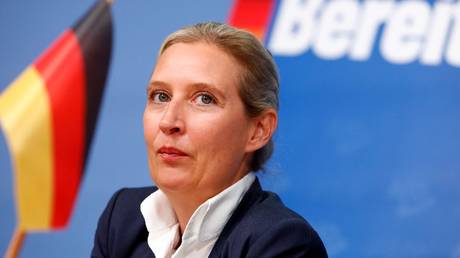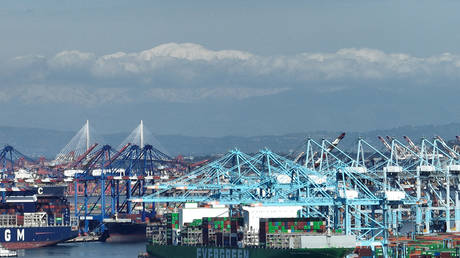
Alternative for Germany (AfD) leader Alice Weidel has said that she would “let the people decide” whether to remain in the EU
Britain was “dead right” to leave the European Union and Germany could end up following suit, Alternative for Germany (AfD) leader Alice Weidel has said. Weidel’s right-wing faction has become the country’s second-largest party, despite left-wing protests and rumors of an impending ban.
In an interview with the Financial Times published on Monday, Weidel said that an AfD-led government would seek to reform the EU to wrest back national sovereignty from the “unelected executive” that is the European Commission. Should this fail, she said that she would “let the people decide” whether or not the country would stay in the union, “just as Britain did.”
The UK’s 2016 Brexit referendum is “a model for Germany, that one can make a sovereign decision like that,” she added.
The AfD has long called for the “orderly dissolution of the EU,” but dropped this language from its latest policy document, published last summer. The new paper describes the EU as a “failed project,” and calls for the bloc to be reformed as a “federation of European nations,” with all EU laws that supersede national law to be scrapped.
The AfD opposes the EU’s migrant resettlement quotas, its environmental policies, its military reliance on the US, and its embargo on Russian fossil fuel imports.
Since its inception in 2013, the AfD has become best known for its hardline stance on immigration. If elected, Weidel told the Financial Times that her party would “introduce effective border controls … and immediately deport foreign criminals.”
This position saw the AfD surge in support after former Chancellor Angela Merkel opened the country to more than one million non-European migrants in 2015. The party is now polling at around 23%, eight points ahead of Chancellor Olaf Scholz’ Social Democrats (SPD) and second only to Merkel’s Christian Democrats (CDU).
Scholz’ party has reacted to this rise with panic. After it emerged last week that some AfD lawmakers met with Austrian right-wing activist Martin Sellner last year to discuss the potential “remigration” of criminal and “non-assimilated” immigrants from Germany, more than two dozen Social Democrat parliamentarians urged the government to ban the AfD over its allegedly “extremist” positions.
A parliament-funded watchdog group called for such a ban last year, while a court in Cologne ruled in 2022 that Germany’s domestic intelligence agency could legally place the party under surveillance.
Over the weekend, left-wing groups marshaled hundreds of thousands of demonstrators onto the streets of Berlin, Cologne, Hamburg, and other major cities to protest against the party.
These protests will not stop the “inevitable” participation of the AfD in government, Weidel told the Financial Times. However, while the party may score some wins in upcoming state elections this year, she said that the refusal of Germany’s major parties to work with the AfD will likely prevent it from coming to power in Berlin until the federal election after next in 2029.
The center-right CDU will be the first party to abandon its boycott, Weidel predicted. Elections in the state of Hesse last year proved “that we can form a clear right-wing majority. And the CDU can’t refuse to accept that in the long term,” she said.




